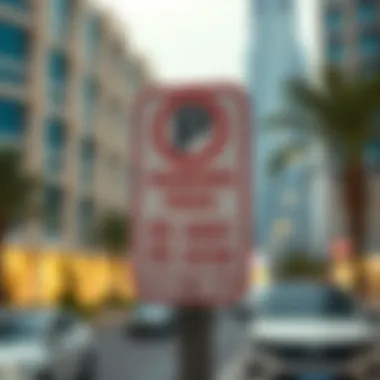Parking Regulations in Dubai: Free Parking Insights


Intro
Dubai, a bustling metropolis where modernity meets tradition, is replete with diverse parking regulations that can be puzzling for both residents and visitors. The intricacies of these rules are often underappreciated, particularly when it comes to the question of whether parking is free on Fridays—a topic that can stir various assumptions and misunderstandings.
Better understanding of parking regulations affects not only individual drivers but also businesses and real estate dynamics. For those considering investments or settling down in the Emirate, comprehending these laws can greatly influence choices and strategies related to urban mobility and property acquisition. The essence of this article lies in unpacking what Fridays mean for drivers in Dubai, particularly in terms of the parking fee structures that govern this essential aspect of daily life.
Regulations don’t merely serve a purpose; they reflect broader trends and shifts in urban planning, economic stability, and real estate desirability. As more people flock to Dubai, awareness of parking nuances becomes paramount for a seamless experience, whether one is a local or a tourist. The aim here is to shed light on these regulations in an effort to provide clarity on the overarching implications for the city’s landscape.
Taking a closer look can reveal valuable insights; thus, readers are encouraged to wade into the depths of this intriguing subject, which holds more importance than meets the eye.
Understanding the Parking System in Dubai
Navigating the labyrinth of parking regulations in Dubai can sometimes feel akin to solving a Rubik's Cube. It’s multifaceted and often requires a good grasp of the local norms. Understanding this system is crucial for residents, visitors, and investors alike, as it directly impacts daily commutes, leisure activities, and even property values. Knowledge of parking regulations plays a pivotal role in streamlining much of the city’s urban mobility, helping individuals make informed decisions about where and how to park. Additionally, it can influence real estate investments in terms of proximity to parking facilities and local amenities.
Overview of Parking Regulations
The parking regulations in Dubai are administered by the Roads and Transport Authority (RTA), which continually tweaks these rules to manage the ever-evolving needs of residents and tourists. Regulations are in place for a reason; they regulate traffic flow, enhance public safety, and ensure that the city remains accessible. Each district may have its own particular set of rules, which can lead to confusion if one is not well-informed. Therefore, a comprehensive understanding of these regulations is not merely beneficial, but essential for effective navigation around the busy streets of Dubai.
Types of Parking Facilities
Dubai boasts a range of parking facilities that cater to different needs. These can broadly be categorized into three types: On-Street Parking, Off-Street Parking, and Public Parking Lots.
On-Street Parking
On-street parking is all about convenience. Found along many of the bustling avenues in Dubai, these spots offer a quick solution for those just needing to pop in and out of shops or eateries. The key characteristic of on-street parking is its accessibility; you can usually find a spot within steps of your destination. This is a popular choice for locals and tourists alike, primarily because it allows for easy access without having to navigate large parking structures.
However, it does come with its own set of challenges. Spaces can fill up faster than you can say ‘Dubai Mall’ during peak hours, making it less reliable for longer trips. Also, it is typically subject to parking fees during certain hours, and violations can lead to hefty fines, so it’s important to stay alert to signage.
Off-Street Parking
Off-street parking, on the other hand, typically includes parking garages and private lots. One of the significant advantages of off-street spots is the security they offer, often monitored or requiring access through a ticketing system. This gives peace of mind, particularly in busy districts like Jumeirah or Business Bay where temporal crime can be a concern.
Moreover, off-street facilities usually provide a larger number of available spaces, which can ease the headache of searching for a spot. However, they may not always be as conveniently located as on-street options, occasionally forcing a longer walk to your destination. In busy hours, the wait for accessing a spot can also be quite a bother.
Public Parking Lots
Public parking lots serve as a crucial link in the parking system in Dubai. These are strategically placed throughout the city to accommodate large volumes of visitors and residents. They are typically well-maintained and monitored, allowing for a relatively stress-free parking experience.
The unique feature of public parking lots is their varied pricing structures; many even offer free parking on certain days or times, including Fridays—a boon for shoppers or those heading to local attractions. However, their location may not always be as prime as some might hope. That said, they do play a vital role in urban planning efforts, helping to alleviate street congestion and support local businesses by providing a space for customer parking.
The Role of Parking Fees in Urban Management
Parking fees play a crucial role in the urban landscape, acting not just as a financial mechanism but as a tool for regulating the influx of vehicles in densely populated areas. In a city like Dubai, where the population is consistently growing, understanding this role becomes imperative. The effectiveness of parking policies directly reflects upon the convenience of navigating through city spaces, influencing daily commuters, visitors, and indirectly, property values.
Purpose of Parking Fees
The primary aim of parking fees goes beyond mere revenue collection. They serve as a means to manage demand and control congestion. When implemented thoughtfully, these fees can encourage the use of public transportation rather than private vehicles. For instance, when individuals see that parking costs accumulate quickly, they may prefer to opt for taxis or ride-sharing services, contributing to a less congested roadway.
Several factors influence the design and implementation of parking fees:


- Encouraging Turnover: By setting fees for parking, urban planners can foster a quicker turnover of vehicles. This is especially pertinent in commercial districts where high turnover is desirable for business.
- Promotion of Alternative Transport: A well-structured fee system can nudge residents and visitors alike to consider options like the metro, buses, or biking as valid alternatives.
- Environmental Awareness: By creating a financial disincentive for driving, cities may reduce carbon emissions and promote a more sustainable approach to urban planning.
Revenue Generation and Maintenance
The revenue generated from parking fees is pivotal in maintaining and enhancing urban infrastructure. In Dubai, this income is crucial for several reasons. Firstly, it funds the upkeep of streets, parking facilities, and public transportation systems. Without a steady flow of income, maintaining these infrastructures can become difficult, leading to deterioration that affects the city’s aesthetic and functional quality.
Additionally, the revenue can be allocated towards:
- Urban Development Projects: Funds can be redirected into projects aimed at improving public spaces or developing new amenities that benefit the community.
- Smart Parking Technologies: Investing in modern technology enhances parking systems, ensuring that drivers have the tools needed for a smoother experience. Smart parking systems can help locate available spaces quickly, cutting down on the time spent circling and searching.
- Public Services: Ultimately, parking fees contribute to the broader scope of city services, including environmental initiatives, road safety measures, and public transport improvements.
"Parking fees are more than just charges; they are essential tools for smarter urban planning and enhancing city life."
While some residents might grumble about additional fees, it is important to recognize the far-reaching benefits they can foster within an urban community. When evaluated in totality, parking regulations encompass a broad spectrum of impacts, from easing traffic congestion to aiding in the city's development objectives. This makes them an indispensable part of urban governance in Dubai.
Fridays in Dubai: An Exemption Day?
The significance of Fridays in Dubai, particularly regarding parking regulations, cannot be underestimated. In a city known for its rapid development and sprawling landscape, the exemption of parking fees on Fridays offers a unique glimpse into the cultural and social fabric of the region. This day, which is seen as a spiritual and family-oriented day by many residents, provides a break from the usual hustle and bustle of the workweek. For commuters and visitor alike, understanding these exemptions can ease their navigation within the metropolitan area, thus promoting a more seamless urban experience.
On Fridays, many residents prefer to engage in leisure activities or family gatherings, often leading to increased traffic in popular districts. Allowing free parking on this particular day encourages more foot traffic in commercial zones, benefiting local businesses and vendors. Additionally, residents can breathe a sigh of relief knowing they won't incur parking fees while enjoying their time off. This blend of practicality and cultural sensitivity fosters a sense of community during the weekend.
Traditional Free Parking on Fridays
Historically, Fridays have been designated as a day of rest in Dubai, and thus, the local regulations reflect this sentiment by providing free parking across various areas in the city. Generally, from 7 AM on Friday until 7 AM on Sunday, drivers can take advantage of available spaces without worrying about fees. This practice helps alleviate some stress for drivers dealing with packed schedules during the week, creating a sense of normalcy during their weekend errands or leisure pursuits.
However, it is worth noting that this traditional exemption isn't universally applicable to all areas. As the city evolves, authorities might tweak these regulations based on demand, leading us to the next discussion on variations by district.
Variations by District
Different areas in Dubai have established unique characteristics which influence their parking regulations. Understanding these nuances is critical for anyone looking to navigate the city effectively, whether they are residents or visitors.
Downtown Dubai
Downtown Dubai presents a vibrant commercial environment, known for landmarks like the Burj Khalifa and the Dubai Mall. While Fridays might see free parking in some areas, it's not uncommon for spots to fill up rapidly due to the influx of visitors. The unique feature of Downtown is its combination of business and leisure spaces, which necessitates careful consideration of parking logistics. The zoned areas can result in disparities where some sectors continue to enforce fees, making awareness and attentiveness vital for avoiding fines.
Dubai Marina
Dubai Marina stands as a prime example of a mixing pot for both expats and tourists. The stunning waterfront views and lively nightlife contribute to a dynamic atmosphere, often attracting large crowds on Fridays. Free parking is typically available, however it might come with limited space, pushing visitors to either arrive early or seek alternative transport modes. A notable advantage of the Marina is its accessibility to public transport, which might lessen reliance on personal vehicles during popular weekends.
Business Bay
Business Bay, another prominent district, represents Dubai’s business hub. Here, free parking varies by specific zones. While some areas might enforce parking fees, others cater to the Friday exemption. The big draw in Business Bay is its clustering of financial institutions and corporate offices, which see a lull on Fridays. This can provide advantageous yet competitive parking spaces during the day, albeit requiring some foresight on the driver's part to locate a suitable spot.
"Understanding the local parking regulations in Dubai, especially on Fridays, can be a game-changer for both expats and tourists looking to maximize their experiences while minimizing hassle."
Overall, each district in Dubai has its own rules and unique dynamics regarding free parking on Fridays, which can significantly impact how residents and visitors plan their activities around the city. Navigating these subtleties will ensure smoother travel and more rewarding experiences.
Impact on Residents and Visitors
Understanding how parking regulations affect both residents and visitors is crucial for anyone navigating the bustling city of Dubai. Parking is not just a necessity but a lifeline for anyone wanting to access the myriad amenities and attractions the city offers. Thus, analyzing the dynamics of free parking on Fridays is exceptionally relevant for daily commuters and tourists alike.


Significance for Daily Commuters
For residents who commute daily, free parking on Fridays translates into both financial relief and convenience. After a long week of work, many individuals look forward to running errands or meeting up with friends without the added pressure of parking fees. On such a day, the usual strain of finding a parking spot can be eased, allowing for a much more relaxed outing.
Furthermore, the availability of accessible parking spaces enhances the quality of life for those residing in busy districts. Closer parking means less hassle getting to and from destinations. Since it’s common for people to opt for extended outings on their day off, knowing they can park without added costs significantly improves their experience.
"Parking on Fridays affords residents an invaluable opportunity to enjoy their day without the constant worry about parking fees or spaces."
Benefits for Tourists
Tourists visiting Dubai generally appreciate the unique cultural and leisure experiences the city has to offer. Free parking on Fridays can be an attractive lure, making it financially easier for tourists to explore various attractions. Being able to park without incurring additional costs allows visitors to allocate their budgets for experiences, such as dining or shopping—much more valuable pursuits than worrying about ongoing parking fees.
In places like Dubai Marina or Business Bay, where numerous attractions are located, the ability to park for free on Fridays encourages tourists to stay longer and explore. This coupled with the reduced competition for parking on weekends promotes a more welcoming atmosphere.
Some additional notable advantages for tourists include:
- Ease of Access: Finding parking spots becomes less of a chore, giving tourists more time to enjoy their vacation.
- Flexibility in Itineraries: Tourists can shift plans seamlessly without having to factor in parking costs.
- Enhanced Exploration: With free parking, tourists might choose to venture further into Dubai’s eclectic neighborhoods, discovering hidden gems and local experiences.
Ultimately, these parking regulations foster greater community interaction, merge local living with tourism, and reflect the vibrant life that Dubai has cultivated. By examining these elements closely, it becomes clear how these insurance measures play a vital role in the urban dynamics of Dubai.
Exploring Technology in Parking Solutions
Navigating the crowded streets of Dubai can sometimes feel like trying to find a needle in a haystack, especially when it comes to securing an ideal parking spot. Technology continues to play a pivotal role in transforming this vital aspect of urban mobility. With the rapid growth of the city and the increasing number of vehicles on the road, innovative parking solutions have emerged, bringing convenience and efficiency to both local residents and visiting tourists.
Smart parking systems have become a cornerstone of modern urban planning in Dubai. These advanced technologies not only streamline parking processes but also contribute to a larger strategy of urban management. Smart parking involves leveraging sensors, real-time data, and automated systems to enhance the parking experience. This can reduce the time spent searching for parking, ultimately lowering traffic congestion and emissions.
In order to fully grasp the benefits of these systems, it’s crucial to understand how they operate.
Smart Parking Systems
Smart parking systems utilize cutting-edge technology to improve the efficiency of urban parking. Here are some noteworthy components of these systems:
- Sensors and Cameras: These devices monitor parking spaces in real-time, allowing drivers to know which spots are available even before they reach them.
- Data Analytics: By analyzing parking patterns, city planners can make informed decisions about where to build more parking facilities or how to allocate existing spaces.
- Dynamic Pricing: Some smart systems adjust parking fees based on demand, encouraging drivers to use less congested areas or times.
The convenience of smart parking systems can't be overstated. Not only do they save time, but they also alleviate some of the anxiety that comes with parking in busy urban environments. Visitors can enjoy their time in Dubai without the nagging worry of how or where to park their vehicles.
Mobile Apps and Parking Management
In tandem with smart parking systems, mobile apps are revolutionizing how residents and visitors tackle parking challenges in Dubai. These apps provide a one-stop-shop for drivers, combining functionality and ease of use.
Key features of these parking management apps include:
- Real-Time Availability: Users can view available parking spots instantaneously, helping them avoid the hassle of driving around aimlessly.
- Reservation Options: Many apps allow users to pre-book parking spaces, ensuring they have a spot secured before arriving at their destination.
- Payment Processing: Most modern apps integrate payment gateways, allowing for cashless transactions that can simplify the entire parking experience.
These apps contribute significantly to smart city initiatives by promoting sustainable urban mobility. As parking becomes more manageable, individuals are less likely to opt for alternative modes of transport, such as ride-sharing or taxis.
"The integration of technology in parking not only streamlines the process but also enhances urban living by reducing stress and encouraging responsible use of public spaces."
Regulatory Changes and Future Considerations


The landscape of parking regulations in Dubai is not set in stone. As the city grows and evolves, so too must the policies surrounding parking. Recognizing the importance of regulatory changes is crucial for effective urban planning and real estate development. These changes can directly impact the convenience of parking and the value of properties equipped with robust parking options.
Potential Shifts in Policy
Dubai's rapid expansion and diversification present a constant push for new approaches in parking management. Potential shifts in policy could arise from several factors:
- Population Growth: As more people flock to this city, the demand for parking spaces will inevitably increase. Policymakers may need to reconsider traditional practices, allowing for more flexible parking arrangements.
- Technological Integration: Increased use of smart parking systems could streamline the overall parking experience. It can eliminate the guessing game of finding a spot and may result in lengthier stays in premium parking once users start to appreciate the convenience.
- Environmental Concerns: With a global focus on sustainability, regulatory changes might focus on encouraging greener transportation alternatives. Policies that support electric vehicle charging stations and car-sharing services could become more prominent.
One observation worth noting is how Dubai’s parking regulations might react to changing patterns of work and leisure. With many companies opting for remote work, traditional commuting and need for parking could shift, possibly allowing free parking on more weekdays—or imposing new arrangements entirely.
Environmental Impacts of Parking Regulations
Parking regulations aren't merely a matter of convenience; they hold significant implications for our environment. The way that parking is managed can deeply influence urban sustainability goals. Here are some important considerations:
- Space Utilization: Traditional parking lots often occupy large swathes of land that could be better used for parks or community spaces. Adjusting regulations may encourage developers to consider mixed-use spaces that combine parking with amenities.
- Carbon Emissions: Policy changes that favor electric vehicles can promote cleaner air. By providing charging stations and incentivizing their use, the city can contribute to reducing the transportation sector's carbon footprint.
- Public Transport Integration: Regulations can also foster better integration with public transport systems. If parking is designed to facilitate transit options, more people may opt to leave their cars at home, opting instead for buses or the metro.
Strategic thinking about parking can pave the way for a more livable, cleaner, and sustainable Dubai—one that considers the needs of current residents while setting the stage for future growth.
Practical Implications for Investors
When it comes to navigating the real estate market in Dubai, understanding parking regulations is crucial for investors. The city's approach to parking can significantly affect property values and accessibility, two key factors that influence real estate decisions. Parking facilities, especially their efficiencies, create an environment that can either attract or deter potential buyers and tenants alike.
Parking Accessibility and Property Values
Accessibility to parking is more than just a convenience; it can make or break the desirability of a property. Areas with ample and easily accessible parking tend to see higher demand, subsequently boosting property values. This is particularly evident in bustling areas like Downtown Dubai or Dubai Marina where potential homebuyers prioritize the ease of parking access. There’s an old saying in real estate: "Location, location, location"—and in this case, location also includes the nearby availability of parking.
A recent study showed that properties with easy parking solutions tend to attract buyers faster than those where parking is a hassle. Here's why it matters:
- Customer Satisfaction: Properties with good parking solutions lead to happy tenants. Happy occupants often lead to longer lease terms and positive word-of-mouth.
- Marketability: Investments in areas with established parking amenities have an edge in marketing. Listings highlighting parking as a feature often get more traction.
Another aspect to consider is how specific events or days affect parking availability, like the free parking on Fridays, which can sway buyer sentiment. On days when parking is free, foot traffic in commercial areas increases, potentially raising the appeal of nearby residential properties.
Choosing Properties with Superior Parking Options
For investors keen on tapping into Dubai’s dynamic real estate market, identifying properties that offer superior parking options is essential. Buyers are not only looking for a place to live; they want ease of access to their vehicles, especially in such a vibrant and bustling city. Here are some considerations when selecting properties based on parking:
- Covered vs. Uncovered Parking: While uncovered parking may be sufficient in some areas, covered parking often provides added protection for vehicles, making it more attractive to potential tenants.
- Dedicated Parking Spaces: Properties that offer dedicated parking spots, especially in overcrowded areas, are seen as more desirable. This can be a major factor in decision-making for a potential buyer.
- Proximity to Public Transport: Investors should also consider properties that are near public transport stations. Offering both parking facilities and close transport options covers a wider range of buyers.
It’s worth noting that not all areas in Dubai have the same parking culture. Some neighborhoods are designed with more parking space in mind than others. Buyers should steer clear of properties in areas notorious for parking difficulties, as this can hinder future resale values.
Epilogue
As the real estate market continues to evolve in Dubai, savvy investors must keep an eye on parking regulations and accessibility. By understanding the impact of parking options on property values and recognizing superior parking features, buyers can make informed decisions that will benefit them in the long run. The nuances of parking regulations, especially free parking on Fridays, may seem minor at first glance, yet they play a far more crucial role in investment strategies than many might realize. Stay informed, and it could pay dividends.
End: Balancing Convenience and Urban Needs
Navigating the labyrinth of parking regulations in Dubai provides unique insights into the intricate relationship between urban convenience and the pressing needs of a booming metropolis. As we put the spotlight on the complexities surrounding parking—especially the sought-after free options on Fridays—a clearer picture emerges: the necessity of striking a balance.
The role of parking in major urban centers like Dubai can't be overstated. It serves not only as a. logistics solution but is deeply intertwined with real estate values and urban mobility. Hence, the implications of regulating parking go beyond simple convenience; they reflect broader strategic considerations in city planning.
Key Considerations
- Convenience for Residents and Visitors: Free parking on Fridays offers tangible benefits for local dwellers and tourists alike, simplifying accessibility to shops, attractions, and community events.
- Urban Mobility: As populations swell, encouraging efficient parking solutions helps mitigate congestion, promoting smoother traffic flow and more sustainable urban spaces.
- Real Estate Dynamics: The availability of parking can significantly influence property values. For investors and prospective homeowners alike, understanding parking regulations can yield greater insights into market trends.
- Environmental Impact: Simultaneously, the way parking is managed can have environmental repercussions. Curbing excessive parking availability can encourage alternative transportation modes, fostering a greener city.
"Parking is more than a spot to leave your car; it serves as a reflection of a city’s larger strategies on mobility and growth."



